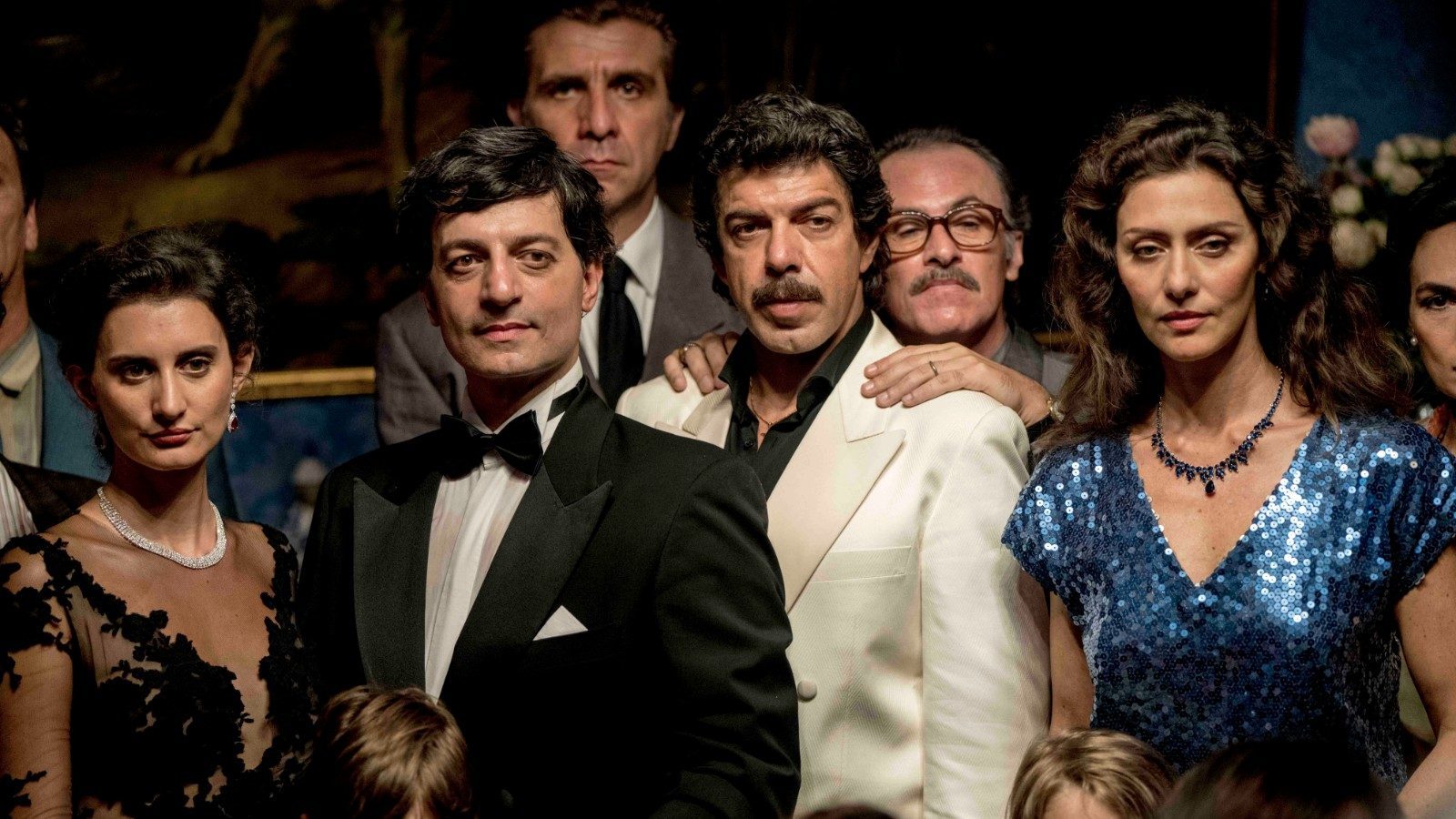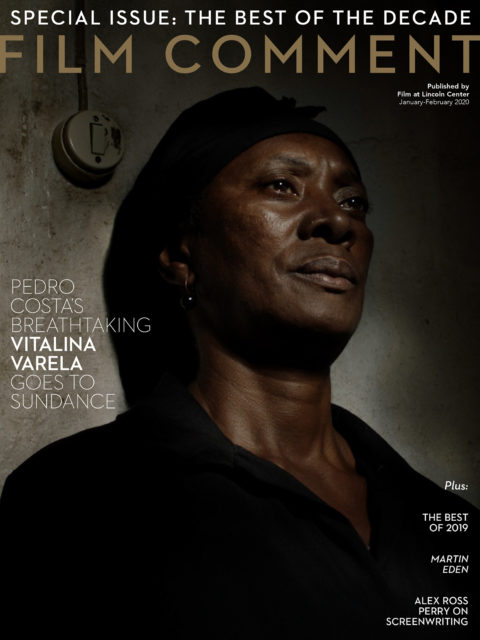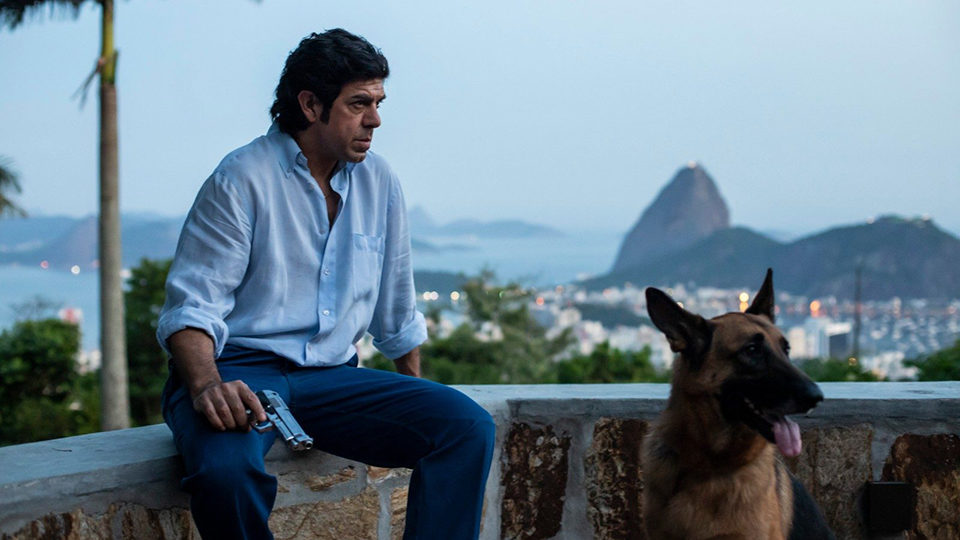By Molly Haskell in the January-February 2020 Issue

The Big Screen: The Traitor
(Marco Bellocchio, Italy/France/Germany/Brazil, Sony Pictures Classics, Opening: January 31)
Another elegiac gangster film by a septuagenarian director, Marco Bellocchio’s Sicilian saga clocks in at a relatively brisk two-and-a-half hours, but, as with its American counterpart, The Irishman, it spans continents and decades while casting a retrospective eye over the iniquities of the Cosa Nostra during one of its temporary if spectacular decimations. Dense and brooding, but, like Scorsese’s film, vigorously told, The Traitor also unfolds under the looming shadow of mortality, of time running out for aging kingpins, and of debts coming due.

From the January-February 2020 Issue
Also in this issue
At the center, a superb Pierfrancesco Favino plays Tommaso Buscetta, the informer who fingered members of the rival Corleone family and precipitated what was for Italy the trial of the century: lasting from 1986 to 1992, the Maxi Trial, held the country spellbound in a media-ready melodrama that no playwright could invent. The scenes portrayed are mind-boggling. In a specially constructed courtroom within a Sicilian prison, inmates shout from behind a glass window. One demands to be heard as an interrogator—the judge accedes. Another displays a bloody mouth: he has sewn his lips shut. Wives join the chorus, bedlam ensues.
Before then, the movie opens with a long, noisy blast of a party, a last-ditch attempt to reunite the two warring factions that only reveals fraying seams in both the mob families and the marital ones. The music plays, couples dance; this spectacle of a tribal culture on the verge of collapse might be the opera buffa version of the great ballroom scene in Visconti’s The Leopard, that valedictory moment when the gentry foresees its own demise. Buscetta momentarily leaves the party, scanning the horizon for his son. When he finds the drug-addled Benedetto staggering from the sea, Father drags him toward the villa, beating his son as he does—the first sign of the devastation of heroin and a foreshadowing of the calamities to come.
To escape threats on his life, Buscetta flees to Rio, setting himself up in style in another stunning villa overlooking the sea. In doing so, he abandons his sons to their fate—an act that will haunt him more than any murders he may have directly committed. Arrested by the Brazilian police he is subjected to information-extracting tactics the mafia could only admire. At one point he is flown in a helicopter over the sea and forced to watch while his wife is dangled from a neighboring helicopter. Senora Buschetta is then transferred to America, and if he ever wants to see her again, he must cough up names and deeds—the ostensible reason for his decision to turn snitch.

The Traitor (Marco Bellochio, 2019)
Because of the complexity of the film’s story, its different time frames, and DeMille-size cast, Bellocchio furnishes explanatory titles and bulletins for the non-Italian viewer. In the contrapuntal rhythm now favored by gangster films, we cut back and forth between movement and stasis, from violent hits—cars explode, a warehouse reverberates with bullet fire—to scenes of menacing quiet. Rendered back to Palermo, Buscetta finds himself in a series of confrontations with Giovanni Falcone (Fausto Russo Alesi), the heroic prosecutor who would secure some 360 convictions and pay for it with his life in a car explosion.
Their duet begins in wary antagonism: Buscetta claiming the new mafia is not like the old one as he tries to portray himself as a man of honor with shopworn and patently false claims (never kill children; help the poor; no trafficking in heroin), while Falcone replies, “The older noble mafia is a myth.” Buscetta’s charm offensive wilts before the quiet integrity of his interrogator. The pariah and the prosecutor, once on opposite sides, have both become mafia targets, and as they ruefully discuss their pending deaths, not if but when and how, they develop a camaraderie that turns into affection, even love.
Aspiring to virtue according to the original Latin definition of vir (manliness), they are like two Roman soldiers on the battlefield: “I who am about to die salute you.” If this is a somewhat more heroic portrait than Buscetta’s self-serving career and hedonistic lifestyle (three wives on three continents) might justify, let the record show he did go on to furnish information to both the Italian and U.S. governments. Thanks to his help in the famous “Pizza Connection” case of 1985, he was given American citizenship and a place in the witness protection program. Unlike Falcone, he would live out his natural life, dying of cancer in 2000 at age of 71, in an “unidentified location.”
Bellocchio, a maestro of family—here in both upper and lower case—portrays this pair’s unlikely brotherhood as the central bond of The Traitor. As director of the harrowingly beautiful and perhaps unsurpassed Fists in the Pocket (1965), his debut feature, he has a deep feeling for the psychological chamber music, both harsh and sweet, of the ties that bind, and even his dramatizations of political figures and social issues are anchored in micro family or familial relationships. Good Morning, Night (2003), about the abduction and killing of Aldo Moro by the Red Brigade, finds its nerve center in the intensely ambivalent interplay between Moro and the pretty daughter-like figure of his captor though the two never actually come face to face. Vincere (2009) relates the story of Mussolini through the eyes of the mistress he once loved and later scorned.
Fists in the Pocket, the story of a provincial bourgeois family coming murderously apart, and made when he was only 25, was taken as a portent of ’60s rebellion, but over time it has emerged as something greater and more idiosyncratic: an up-close portrait of sexual perversity and homicidal mania made more disturbing by the appalling charisma of its actors—an echo perhaps found in Favino’s performance in The Traitor. Like many a spectacular debut, Fists in the Pocket set a standard of expectation that was hard to meet, and unlike his contemporary Bertolucci, Bellocchio remained in Italy. But if we have been exposed to less of the director’s work than it warrants, it is our provincialism rather than his that bears the blame.
Molly Haskell has written for many publications, including The Village Voice, The New York Times, Ms., Saturday Review, and Vogue. She is the author of Steven Spielberg: A Life in Films and From Reverence to Rape: The Treatment of Women in the Movies.







